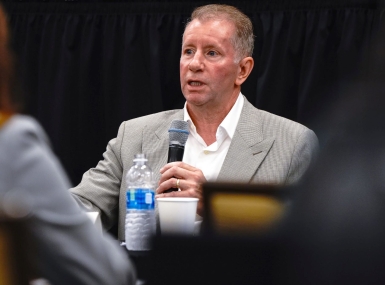Demographic change, economic opportunities drive LUCC symposium

Urban counties will face uphill batte for legislative priorities in next Congress
A little more than a week after a change-themed election, members of NACo’s Large Urban County Caucus met in New York City to try to stake out where the country’s path forward offered economic opportunities.
They parsed the roadmap for the next four years provided by the electoral results, but also looked far beyond that, to the country the United States will grow into — one that the U.S. Census Bureau projects will be majority-minority by 2044.
With that in mind, Angela Glover Blackwell, CEO of PolicyLink, told a luncheon audience that inclusion has become an economic imperative.
“If the people of color who are becoming the majority rapidly, do not become the middle class, there will be no middle class,” she said, echoing the same sentiment about other roles in the economy.
“This is no longer something we can do because it is a moral imperative. We have to do it because the fate of the nation is dependent on what happens to the very people who we have been systematically leaving behind. If we don’t get it right for the people who are going to become the majority, we don’t get it right for America.”
For years, urban counties worried they had it wrong, and took more than a generation to feel like they got it right, again. Although a gentrification movement has accompanied the return to urban life for many Americans.
“The great migration away from the inner cities, sucking the life out of the inner cities, started 30 years ago,” said Keith Carson, a supervisor in Alameda County, Calif., which includes Oakland. “(People) moved to the suburbs and left us in a desolate situation. The banks left, the lending institutions left, the educational institutions were challenged.”
His county has rebounded on the strength of revitalized assets, as have many others, including in the Rust Belt (see story, page 3), but going forward, Alameda County is taking a proactive, inclusive look at what it needs to succeed.
“We have people who need to be heard and you really have to sit down with the people you’re trying to help,” he said. “It can’t be an academic exercise, it can’t be a drive-by. You have to be embedded in those communities on a long-term basis to get trust, get buy in and develop a relationship.”
That pays off when the community has to make a move.
“We have a common voice when we come to our Legislature,” he said. “We don’t come as just counties, we come as counties, cities and business because the quality of life we want to impact is everyone’s quality of life.”
Looking Ahead
After an election that was generally delineated between urban and rural counties, LUCC steering committee members heard the legislative outlook. NACo Executive Director Matt Chase stressed a different result in the presidential race wouldn’t have made counties’ fights any easier.
“If Secretary Clinton was becoming president, we’d have a different list, but just as big a lift on intergovernmental fights affairs,” he said. “We’re focused on…the battle between the local, state and federal governments.”
Deputy Legislative Director Paul Beddoe said most immediately, the tax-exempt status of municipal bonds was in jeopardy, with tax reform a high priority for a Republican Congress and White House. “We’ve been told in no uncertain terms that muni-bond limitations are definitely on the table,” he said. “They’ve got to try to figure out a way to pay for some of the tax cuts that they promised.”
This warning followed the LUCC steering committee members’ recounting of the billions of dollars in tax increases and bond issues their voters approved for infrastructure and transportation projects.
“All these bond issues you’ve put yourself on the line for on the local level, if new limitations come up that will make them less attractive instruments to investors, it’s just going to raise the cost of borrowing and reduce the value of those projects,” Beddoe said.
Medicaid is targeted for block granting (see story page 4). Beddoe said a measure to allow inmates to keep Medicaid coverage would not likely happen before the end of the Obama Administration.
Chase warned that a lot of federal legislation could find copycats on the state level, and counties should look to Congress for what their Legislatures may emulate.
LUCC Chairman Jim McDonough of Ramsey County, Minn. encouraged colleagues to look for opportunities in the next Congress and the Trump Administration
“Where do we have direct contact with influencers in Washington? We need to know who has those types of relationships with decision makers,” he said. “We’re still going to continue to do what we do at home. We have Rust Belt cities, West Coast cities, South, Southwest, Northern cities. In some sense, all of those issues are intersecting all of us.”
Out and About
Mobile workshops took attendees all over New York, Kings and Richmond counties, or as most know them, Manhattan, Brooklyn and Staten Island.
The NYC Citywide Ferry, in development now, will provide another option for a projected 4.6 million trips a year once the 23-port system throughout the five boroughs is completed in 2018.
The Red Hook Community Justice Center is in a geographically-isolated part of Brooklyn. A single judge hears cases that would otherwise go to civil, family or criminal courts, and deploys sanctions and services including treatment and community restitution.
Elsewhere in Brooklyn, the Navy Yard has become home to more than 7,000 jobs and a variety of tenants, including entertainment and manufacturing. Another naval base, on Staten Island, has become a mixed-use community.
Back on Manhattan, the High Line, a park built atop nearly a mile of elevated train tracks by a nonprofit organization, has revitalized an area once deemed more appropriate for training young drivers and turned it into a high-traffic residential and commercial area.
The 2017 LUCC innovation symposium will be held in Salt Lake County, Utah, with Broward County, Fla. leading as the likely 2018 location.
Attachments
Related News

National Association of Counties launches program to increase housing supply in urban counties
NACo and Smart Growth America announce the launch of the first Counties for Housing Solutions (C4HS) cohort, a program designed to increase housing supply in urban counties.

Counties must highlight security measures to public before elections
Large urban counties can cultivate public trust in elections by investing in updated voting equipment and properly training and supporting their election administrators.

